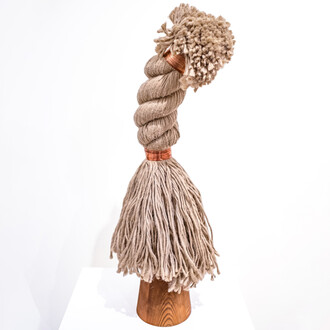The gallery space never reveals itself immediately, and its mystery inspires our imagination. When confronting a place beyond our imagination, we can discover the purity in ourselves; so pure encounters and experiences are awaiting us there.
(Makoto Ofune)
Olivier Malingue is pleased to present the first solo exhibition in the UK of Japanese artist Makoto Ofune. Born in Osaka in 1977, Makoto Ofune graduated in 2000 from Kyoto University of Education with a major in Japanese painting. In 2016 he was awarded the Fellowship of Overseas Study Programme for Artists by the Agency for Cultural Affairs and has spent the last year undertaking a residency in Paris.
The exhibition is a survey of works produced over the past decade which combine traditional Japanese painting techniques with an abstract vocabulary, revealing his search for eternity and harmony. By creating an atmosphere that invites meditation, he proposes that the viewer considers not only the pieces themselves, but also the space created by them.
In Ofune’s richly textured works, layers of powdered mineral pigments known as iwa enogu are applied to Japanese hemp paper with nikawa, an animal gelatin glue. These stones are crushed by hand to a fine powder, and the resulting pigments enhance the vibrancy and depth of the original raw materials. These techniques are usually seen in nihon-ga (traditional Japanese painting), but Ofune uses these jewel-toned pigments in a contemporary manner, creating atmospheric pieces that are both meditative and timeless.
In the Reflection Field series, Ofune focuses his attention on raw materials: small, roughly cut pieces of autunite, sodalite and welded tuff. He coats the cut surfaces of these stones with powdered mineral pigments, blurring the lines between the natural element and his creative process. These stones are presented to the viewer as if they were artefacts, yet by applying the crushed pigments in shades of deep blue and bright white, they are elevated from their coarse, natural state, becoming refined and almost otherworldly.
Ofune’s exploration of Japanese tradition and culture is not only confined to his technical knowledge. Echoing traditional Japanese murals, Eternal #5 spans the entire wall, its patterns of darkness and light rippling over the canvas. Developed over seven years, its scale and depth imbues it with a meditative and hypnotic quality. This sense of tranquility is also reflected in the Still Wave series, appearing like oval pools, with a light emanating from the centre, diffusing through the work. In contrast to this stillness, earlier pieces from the Wave series consist of lightness and movement, with tones ranging from cool silvery greys to bright dappled blues. Exploring transient modes of existence and ethereal elements, his works appear connected to the metamorphic flow of the human state and the natural world: the seasons, light, weather and time.
Heavily influenced by spirituality, but without a connection to any particular religion, Ofune seeks to “connect with the infinite” through his practice, placing his works in sites of cultural and spiritual significance. This has been seen in his Void series, where large-scale circular pieces have been installed at shrines and in churches. By acknowledging this harmony between his artworks and spirituality, he bridges the gap between the tangible and the intangible.
Ofune’s exhibition plays with opposing themes: the physical and the spiritual, darkness and light, movement and stillness. However his true mastery lies not only in his technical skill, but also in the “textural atmosphere” he creates, which encourages the viewer to find harmony and wholeness.
















